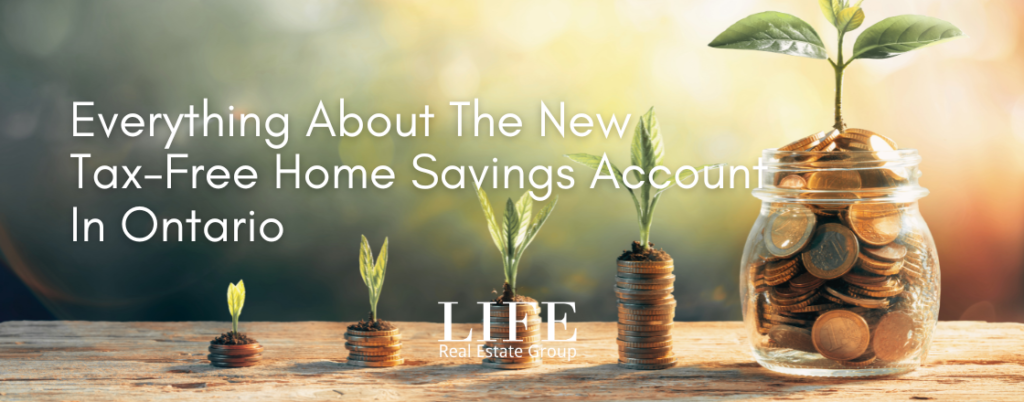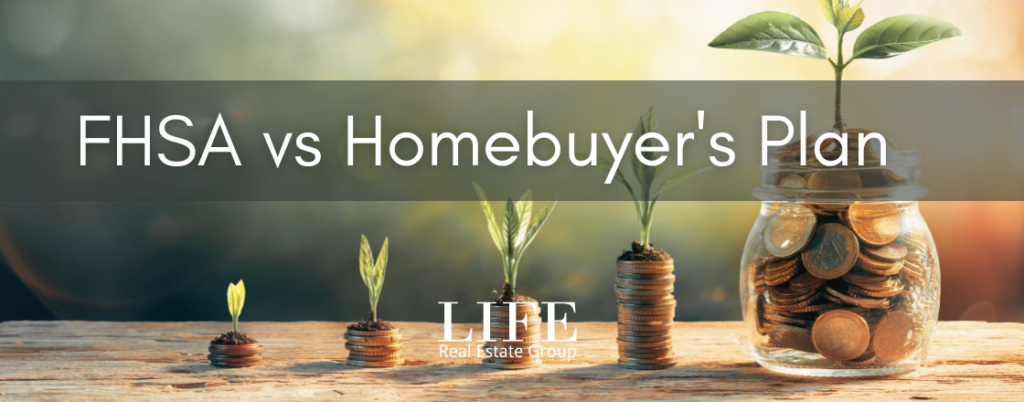
You might’ve heard of a Tax-Free Savings Account (TFSA), a popular savings option in Canada that began on January 1, 2009. It allows Canadians like yourself to save and invest your money without paying taxes on growth or withdrawals.
Now, there’s a new addition to the TFSA family – the Tax-Free Home Savings Account (FHSA), a registered account that is aiming to help more Canadians enter the housing market. In this blog, we will go over what the FHSA is, how it works, and everything you need to know about it.
What is a Tax-Free Home Savings Account (FHSA)?

An FHSA is a new savings account designed to help you save for your first home while enjoying the same tax benefits as the regular TFSA. You can open your very own FHSA to start saving for your first home on April 1, 2023!
How does an FHSA work?

The FHSA works in a similar way to a regular TFSA. You can contribute up to $8,000 per year (which is tax-deductible) and any growth of the account is tax-free.
The FHSA has a lifetime contribution limit of $40,000 dollars. (If you have not used your contribution room for the year, you can roll over the amount you didn’t contribute into the next year).
For example, if you contributed $3,000, this year, you would have an additional $5,000 available to contribute next year (5,000 + 8,000 = $13,000 limit).
To open an FHSA, you need to be a Canadian resident, 18 years or older (and not turning age 72 or older in the year). You must also have not owned a home where you have lived at any time during the calendar year before you opened the account or at any time in the prior 4 calendar years.
What kinds of investments can you make with your FHSA?

You can make the same types of investments as you can with your TFSA which includes mutual funds, publicly traded stocks, ETFs, securities, government and corporate bonds, and guaranteed investment certificates.
But keep in mind that you still have to meet certain criteria to make a qualifying withdrawal.
To qualify, withdrawals must be used on your first home, you must present an agreement to buy or build a qualifying home before October 1st of the year following the withdrawal year, and the qualifying house must be located in Canada. This home must also be your principal place of residence within one year after you have bought or built it.
When making a withdrawal you can make one or multiple withdrawals, but the account must be closed by the end of the year after your first withdrawal is made. Keep this in mind when deciding when to make contributions and when to withdraw.
If you don’t end up using the withdrawals on a home, you can choose to deposit it and capital gains into your RRSP, but you will be subject to the withdrawal taxes based on a registered retirement savings account.
What are the benefits of an FHSA over using the Homebuyer’s plan?

The Government of Canada also has a Homebuyer’s Plan also known as the HBP, which allows first-time homebuyers to withdraw up to $35,000, tax-free, from their RRSP (registered retirement savings plan).
You must pay what you withdraw back to your RRSP within 15 years but it is a good option for first-time home buyers who’re looking to make their first purchase.
With FHSA withdrawals, they do not have to be paid back. Withdrawals, after you pay back into your HBP, are taxed, whereas qualifying FHSA withdrawals are tax-free.
The best part about both of these programs is that they can be used in combination to make housing even more affordable. This means you can put $75,000 towards a new home, along with the capital gains your FHSA accrues.
What else do I need to know about a FHSA?

Here are some additional things to keep in mind about an FHSA:
- For the most part, you can transfer money, GICs, bonds, and mutual funds from your RRSP to your FHSA without any immediate tax consequences. This is only true if it is a direct transfer and does not exceed your unused FHS participation room.
- If you contribute more than your participation room for the year, you will generally have to pay a tax equal to 1% of the highest excess FHSA amount in the month of that contribution. You will also have to pay for each month this excess remains in your account so be mindful of how much you are contributing.
- Homes that do not qualify are where you only own tenancy rights, non-residential properties like stores, empty land not currently being developed into a qualifying home, vacation properties that are not a principal residence, and properties outside of Canada.
With the FHSA being such a new initiative, it’s good to have a base-level understanding to help you decide if contributing is for you. That being said, this is a great initiative for first-time home buyers, and increases the affordability for a new generation of homeowners!
If you are looking at your options within the real estate market, then the professionals at LIFE Real Estate Group are here for you. Click here to get in touch with someone who will guide you through the market on your own unique journey: https://lifereg.ca/
For 5 things to keep an eye out for when buying a new home, click here: https://lifereg.ca/dont-miss-these-5-things-when-looking-to-buy-a-home/
For how to apply and get pre-approved for a mortgage, click here: https://lifereg.ca/how-to-apply-get-pre-approved-for-a-mortgage/

